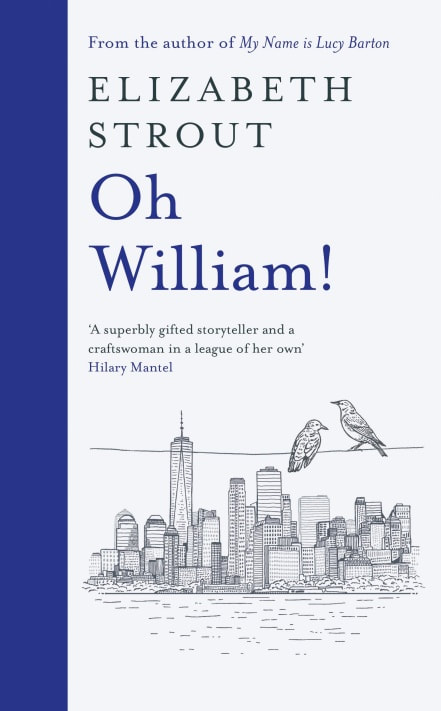Book Review of Elizabeth Strout's Oh William!

I’ve read a few enjoyable and comforting reads in recent weeks, but Elizabeth Strout’s Oh William! is the first book I’ve picked up, in absolutely ages, that I struggled to put down. I read it in two sittings.
The strength of Elizabeth Strout’s Oh William! is the connection that the reader makes to Lucy Barton the narrator. She tells the story in first person and focuses on the minutiae of life, which she uses to explore big life questions. The effect that an individual’s childhood has on their present and future self is never far from the surface of the book.
In Elizabeth Strout’s Oh William!, Lucy’s second husband has recently died. She finds herself spending time with her first husband, William, and she and he go on an actual and metaphorical journey of reflection. William’s own life is unravelling as his third marriage disintegrates. Lucy and he discover hidden family secrets that create insight and provide them with greater understanding of who they are and why they are as they are. We learn a lot about William’s mother, Catherine and through that see the complexity of son/mother relationships. I’m sure if this were a high school text it would be worth analyzing from a Freudian stance.
Oh William! Is a book that focuses hugely on connection. The narrator’s own self-awareness of time passing, the significance of perception and her ability to pinpoint precise emotion is incredible. There is absolutely nothing twee or sentimental in the writing, though it is nostalgic, particularly in relation to their shared grown up children. The sophistication, yet simplicity of the writing in Elizabeth Strout’s Oh William! makes it an utter joy to read.

Book Discussion Questions for Elizabeth Strout's Oh William!
- The theme of free choice appears in the book when William shares an anecdote with Lucy explaining how someone in the Obama administration said that although he was employed to make choices, mostly the administration simply did things. There was no actual choice to make. We do, but we don’t choose. Discuss this statement. Is it completely at odds with a belief in free choice?
- Lucy Barton is an earlier book written by Elizabeth Strout. In that text we learn about her escape from her abusive childhood. She writes about a time when her mother, from whom she is largely estranged, unexpectedly visits her as an adult in hospital.Oh William! illuminates what we learned in the earlier book about the mother/daughter relationship. If you’ve read Lucy Barton did it enhance your reading of Oh William. Discuss?
- Discuss how Lucy loves both her husbands in different ways.
- What significance does Lucy attach to the nursery teacher not picking up William when he cried?
- Discuss Lucy’s approach to motherhood. Do you think she is a good mum? Why or why not?
- Why was it so significant to learn that Catherine came from an impoverished background?
- How much sympathy do you have for Catherine? Discuss the reasons for your viewpoint.
- Oh William! is a snapshot of the life of a family. Family life could be recorded about anyone, so what makes Oh William! a book worth reading?
- Sum up Lucy Barton’s character in five or less adjectives.
- Lucy mentions more than once how different David and William looked. Discuss whether you think David is presented unfavorably to William. What point is Lucy making in comparing the two men?
- Lucy, the narrator, tells us that she isn’t going tell the reader much about her second husband David. Why do you think she does this?
- Lucy talks directly to the reader throughout the novel, almost as if they are friends. Yet, she also shows awareness that she is a novelist and that the reader is a stranger. Do you think Elizabeth Strout has created a convincing narrative style? Discuss.
- Discuss the meeting that Lucy has with William’s third wife in the store. What is the significance of the recording of this conversation?
- Could you be friends with Lucy Barton? Why or why not?
- Lucy said that William was the only person who made her feel safe. This is even though his adulterous behaviour would suggest that wouldn’t be the case. What does this reveal about Lucy? Discuss this, either in relation to the novel Lucy Bartonand/or Oh William!.
- Book Club Questions for Elizabeth Strout’s Oh William (if you haven’t read the book!)
- The book is called Oh William!, but is it really about William? Discuss.
Book Club Questions on Elizabeth Strout's Oh William! (If you haven't read the book).
- Lucy’s daughters are livid with her when she leaves William, even though they are young adults. They blame her, but don’t know about his many affairs. Lucy didn’t feel it was for her to share that information with her children. Do you think it is important to be completely open when talking to adult children about reasons for a divorce? Discuss your viewpoints.
- Pam was happy with her second husband but often found herself thinking about her first husband. Discuss the complexities of second and third marriages and family dynamics.
- Lucy is quite scornful of David’s luxurious house and felt like it was a show home. How important are houses and homes to you? What makes home ‘home’?
- Lucy went to the stage door to speak to the cellist she admired. Six weeks later she married him. What is the boldest thing that you’ve ever done?
- Lucy hates William’s second wife who had been her friend, yet had been having an affair with William throughout the friendship. Lucy is gracious toward his third wife, who is twenty-three years his junior. Discuss the complexities of accepting a future partner of your ex into your life.
Personal Response to Elizabeth Strout's Oh William!
The phrase Oh William! made me think of a different book Oh David! by David Shannon. It is a text I used to read to Key Stage 1 children when I worked as a librarian. Oh David! features a little boy who does a series of naughty acts from knocking over a vase to running down the street naked. Despite all his misdemeanors his mum loves him anyway.
This is, I think, kind of how Lucy feels about William. In life we make mistakes, we don’t understand why people act the way they do, we put faith in individuals when perhaps it isn’t deserved and we can’t ever really understand or explain why we do the things we do.
As Lucy observes the actions of her first husband she frequently says Oh William! This sums up the emotions she feels toward him, without perhaps having to overtly articulate or fully understand them. We are all a bundle of complex and contradictory emotions, which leave us baffled, yet alive!